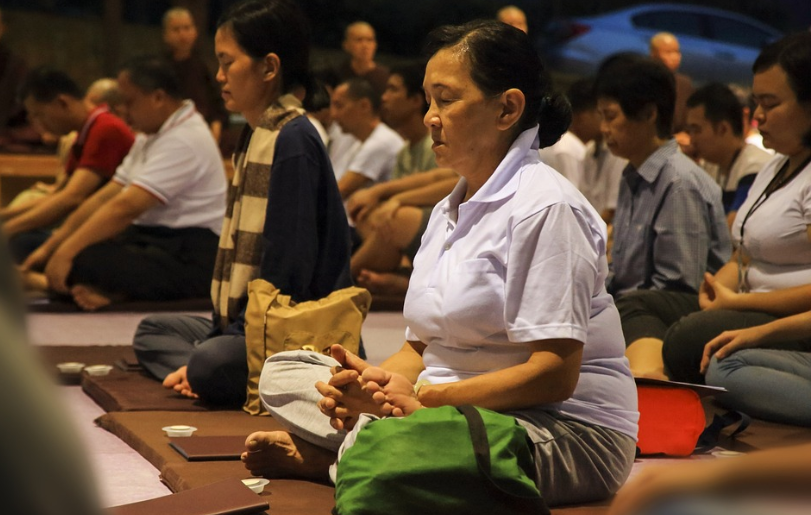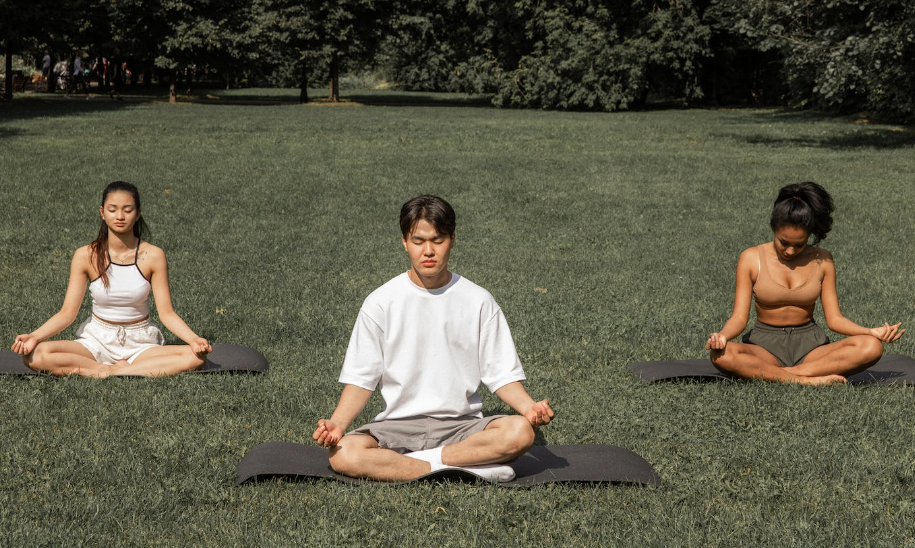Why Meditation Makes Me Sleepy?
Discover why meditation makes you sleepy and how to stay awake when you’re tired.

Selfpause Affirmation App
Download the app to get 1,000’s of affirmation meditations and everything you need to write, record and listen to your own.
If you have trouble staying awake while practicing meditation, there are several things you can do to keep yourself awake. You can take a cold shower to wake you up, try to visualize bright lights or emphasize your in-breath. Stress is often the cause of sleeplessness. In addition, it can cause burnout and exhaustion. Therefore, it is crucial to recognize when you need to take a nap or rest. Fighting to stay awake will only tire you further. It is also nearly impossible to stay awake when you are feeling tired.
Getting enough sleep

One way to get enough sleep is to practice meditation. The benefits of meditation extend to your physical health. Often, you’ll experience increased waking hours during the day and reduced sleep during the night. In order to avoid these effects, you should try to get to bed at the same time every day.
Some people may find it hard to meditate, but it has many benefits. First, it helps the body and mind settle. Even if you meditate right after waking, you should give your body time to adjust. This way, you won’t have difficulty falling back to sleep. Another way to help your body relax is to practice exercise. Any physical activity, even just walking or dancing, will help relieve restlessness. As Andy Puddicombe, the co-founder of Headspace explains, the brain needs rest in order to be focused and alert.
Another method is to go to bed earlier. By getting a good night’s sleep, you’ll be more alert during meditation. Deepak Chopra suggests going to bed earlier. You should also try to meditate for five minutes after waking up. This way, you will learn to distinguish between sleep and meditation. When you wake up, you’ll feel dull and groggy, whereas when you emerge from meditation, you’ll be clear-headed, relaxed, and happy.
If you struggle to get enough sleep, meditation may be an effective way to overcome your sleeping difficulties. It can reduce your stress response, decrease cortisol production, and increase DHEA and melatonin levels. A good night’s sleep can improve your memory, reduce stress, and prevent premature aging. Meditation has been used for thousands of years by different cultures and religions. It trains the mind and body to relax, which enables the autonomic nervous system to function properly.
Drinking water before meditation

The benefits of drinking water before meditation are numerous. It can awaken you during your practice and help you relax. Water helps you stay hydrated, and it can also help you concentrate better. Water can help you achieve a deep state of meditation, and it will help you get more out of your practice.
It also helps to prevent drowsiness. Meditation can be difficult when you are tired. Your brain needs a chance to catch up on rest. When you are drowsy, you can easily fall asleep. To avoid this, make sure to drink plenty of water each day.
Some people also find that the cold water on their faces helps them relax. Another helpful tip is to avoid caffeine. Caffeine interferes with sleep, so it is best to avoid it before meditation. Water can also help you wake up. But make sure you don’t drink too much. The last thing you want is to wake up and meditate only to feel anxious.
You should also avoid eating large meals just before your meditation. Eating a heavy meal can make you sleepy. This is because it takes more energy to digest the food. And it’s likely that you’ll fall asleep during your meditation. It’s a sign that you’re not getting enough sleep.
Drinking water before bed has many benefits, including preventing nocturia, which is an increased urge to urinate at night. It can disrupt your sleep cycle and lead to heart problems, obesity, and depression.
Avoiding slouching
One of the best ways to avoid slouching during meditation is to sit up straight. Many people find sitting upright uncomfortable, but it’s also important to keep your back straight. In addition to sitting up straight, you should also avoid slouching during meditation, which reinforces bad habits.
Practicing meditation with other people

Many people have experienced the same phenomenon – they begin to fall asleep during meditation. This is completely normal and does not mean that you are not engaged in the meditation. However, if you find that you are too tired to stay awake during a meditation session, it’s important to make sure you are practicing meditation with the right type of meditation for your body.
The first step in overcoming the drowsiness issue is to practice meditation in a natural environment, away from any food or other stimuli that may make you feel sleepy. This is a key part of dhyan and takes some time to work. Try to sit in a quiet, natural space, and take your time.
Another effective meditation technique is called five-senses meditation and involves noticing five objects around you. These objects can be anything that you see or touch in a space. These five things can be anything from objects on your desk or on a walk to the fabric of your clothes, to the smell of a leaf. Even your cat or other animals can be included.
Practicing meditation in nature will also benefit your mental health. Nature therapy methods, such as cottagecore and forest bathing, are excellent for easing stress. If you’re unable to find a peaceful and natural space to practice meditation in, try practicing meditation outdoors. You’ll reap the benefits of the natural environment as well as improve your ability to fall asleep and stay asleep.
A few people have also noticed that guided meditation helps them fall asleep. You can download podcasts or other audio recordings to help guide you through the process. These meditations often use visualizations to help people imagine a relaxed situation. You can also try imagining sights, sounds, smells, and textures.
Practicing meditation outdoors

There are many health benefits associated with meditation, including a reduced risk of depression and lower stress levels. It is also a good way to increase focus and patience. And while practicing meditation indoors can help you sleep better at night, meditating outdoors is a great way to improve your quality of life during the day.
Practicing meditation outdoors can be helpful because it engages your senses and can help you relax. You may find that it is easy to focus on your breathing and other physical aspects of your practice, especially when you practice it outdoors. However, it’s important to find a quiet place. Choosing a spot where you can sit in complete silence can help you focus better and get a better night’s sleep.
Another benefit of practicing meditation outdoors is that it allows you to get some fresh air. It is essential to get some fresh air when practicing meditation because the warm air will help you stay alert. It’s also helpful to practice meditation while standing. While sitting on a chair, it’s possible that you’ll fall asleep.
Meditation can be challenging for beginners. You might be sleepy at first, but this is a natural side effect of lack of sleep. The best way to deal with this side effect is to keep practicing. It will help you calm down and gain control over your mind. However, it’s important to make sure you find the right type of meditation for you. Otherwise, you won’t be able to stay focused and meditative.
If you find yourself drowsy while practicing meditation, you should try sitting in a quiet room, away from your bedroom. You should also set up a special meditation room where you can practice in a comfortable position. In addition, you should try to stand or walk while meditating, which will allow you to stay alert.
Our Top FAQ's
Some people may feel sleepy after meditation because meditation can help relax the mind and body, which can lead to drowsiness. Additionally, the quiet and calm environment often associated with meditation can also contribute to feelings of sleepiness.
It is common for some people to feel sleepy after meditation, and there is generally no cause for concern unless it is interfering with your daily activities or overall well-being.
The main potential risk of feeling sleepy after meditation is that it can make it difficult to stay awake and alert during the day, which can affect your ability to perform certain tasks or activities. Additionally, falling asleep while meditating can potentially lead to injury if you are in an awkward position or on unstable ground.
To prevent or reduce sleepiness after meditation, you can try meditating at a different time of day, such as in the morning instead of at night. You can also try using a more active form of meditation, such as walking meditation, which can help keep you awake and alert. Additionally, making sure you get enough sleep at night and staying hydrated can also help prevent sleepiness after meditation.
Some potential benefits of feeling sleepy after meditation include improved sleep at night, reduced stress and anxiety, and improved overall well-being. Additionally, feeling sleepy after meditation can indicate that your body and mind are in a state of deep relaxation, which can be beneficial for overall health and wellbeing.
